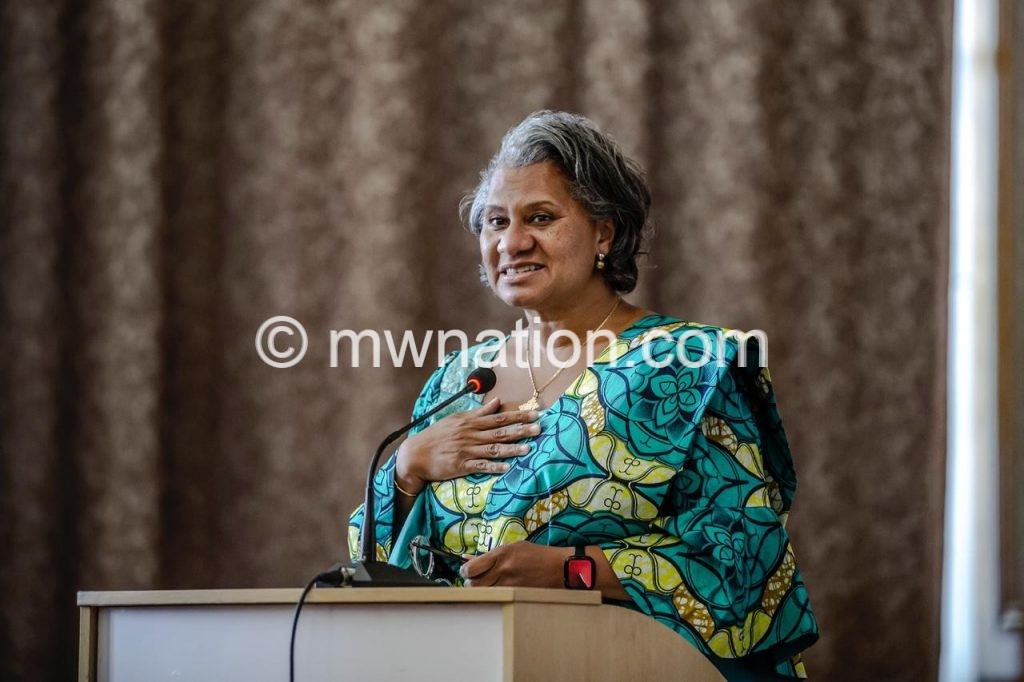Enhancing sexual, reproductive health
UNFPA regional director for 23 countries in east and southern African region JUNITA ONABANJO has completed her weeklong tour of Malawi today, Saturday. Our features editor JAMES CHAVULA catches up with her to discuss Malawi’s commitment towards enhancing sexual and reproductive health.
Welcome to Malawi, you are visiting Malawi as the world faces the Covid-19 pandemic. What inspired this visit?
This visit occurs nearly one year since the landmark Nairobi Summit, which marked the 25th anniversary of the International Conference on Population and Development [ICPD25]. At the ground-breaking conference in Cairo in 1994, governments adopted the Programme of Action, recognising that sexual and reproductive health, women’s empowerment, and gender equality were the pathways to sustainable development.

At the Cairo Conference, Malawi’s representative announced the government’s intention to implement the ICPD Programme of Action. A quarter century later in Nairobi, Malawi reaffirmed its commitment to nurture a policy environment where every woman and girl can exercise her rights and choices. Therefore, the visit aims to take note of old and new challenges that could impede the commitments made, particularly the impact of Covid-19 on access to sexual and reproductive health services for women and girls.
What do you make of the Malawi’s revelation that 40 000 girls became pregnant during the six-month closure of schools to reduce coronavirus transmission?
The impact of Covid-19 has been seen in many different aspects of our daily lives, in communities across the globe. As such, the issue of teenage pregnancy is, therefore, not particularly a Malawi story. However, what the pandemic has taught us all is that we need to increase our targeted efforts to ensure that girls remain in schools.
What does the surge in teen pregnancies say about the importance and implementation of these commitments?
Adolescent pregnancies are a global problem occurring in high, middle, and low-income countries. Around the world, however, adolescent pregnancies are more likely to occur in marginalised communities, commonly driven by poverty and lack of education and employment opportunities. Covid-19 is making existing gender inequality even worse: increases in gender-based violence and sexual exploitation and abuse are being reported around the world.
Pandemics such as Covid-19 can undermine the progress achieved. Therefore, we must all work hard to ensure that women’s reproductive health and rights are safeguarded at all costs; that sexual and reproductive health services continue; and that supplies of modern contraceptives continue to be delivered.
What is UNFPA doing to make sure that girls stay in school beyond pandemics such as Covid-19?
UNFPA in Malawi works to support the government’s efforts and commitments to a people-centred approach to development, in which all people, including women and girls, are afforded opportunities to achieve their potential. Over the years, the Malawi Government has made concrete efforts to ensure that our girls are kept in school.
School enrolment grew by 31 percent between 2014 and 2017. Drop-out rates in primary schools declined from 16 percent to 5 percent for girls and from 14 percent to 5 percent for boys. Government coordination and implementation chance education for girls out of school girls has improved. Average school attendance increased from 73 percent in 2013/14 to 87 percent in 2018/2019. The Primary School Leaving Certificate Exam girls’ pass rate has increased from 66 percent to 73 percent. These are great achievements – but challenges still exist that pose as a threat to efforts to empower girls and women.
Why should countries such as Malawi, which markets itself to the world as the God-fearing Warm Heart of Africa, concern itself with the issue of unsafe abortion?
Limited access to age-appropriate sexual and reproductive health information and services among adolescent girls and boys is worrisome as it fuels school dropout rates, especially for girls, due to unwanted pregnancies and early marriages. Studies show that 17 percent of maternal deaths are due to complications from unsafe abortions. These studies show that more than 70 000 women procure abortions in Malawi each year. Nearly 33 000 of these women attend health facilities after experiencing complications from unsafe abortions.
The population of Malawi remains overwhelmingly young, with 51 percent below the age of 18 and up to 80 percent below the age of 35 years – yet close to 30 percent of all maternal deaths in Malawi occur in adolescents. The new law offers an opportunity for women and girls to seek counselling from medical officers and to get the right information, instead of resorting to unsafe practices, which may lead to mortality and morbidity. Information is key, and it can save lives.
Malawi is one of the countries with high rates of child marriage, despite passing laws that prohibit sex with and marriage to minors below the ages of 17 and 18. What do you think needs to be done to tackle teen pregnancies and child marriage?
Malawi’s demographic profile shows that the population of young people aged 15 to 34 is 34 percent. The youthful population provides the country with a vast human resource potential, which, if properly nurtured and tapped, can greatly contribute to accelerated and sustained economic growth and development.
To ensure that the country is on track to achieve the Sustainable Development Goals [SDGs] and meet its commitments, there should greater investment in securing the future of adolescent girls and young women—those who are most left behind. This includes removing the barriers that prevent adolescent girls and young women from reaching their full potential.
What does the future look like if Malawi continues making laws like the one that outlaws marriage to girls below 18 but does not implement them with the urgency and ambition they deserve?
We believe in the ability of the current government to create a gender-equal society, one in which the rights of all people, including those of women and girls, are respected. Achieving the SDGs and completing the agenda of the ICPD will require a collective response.





